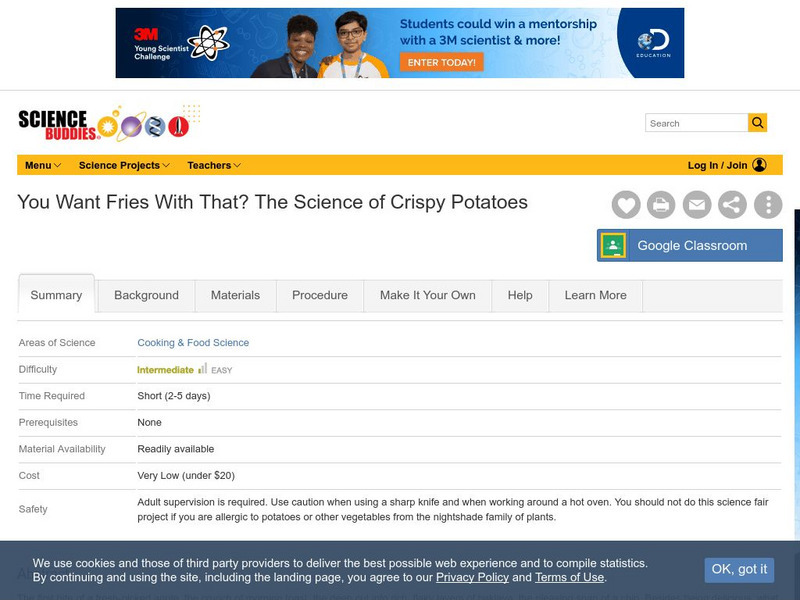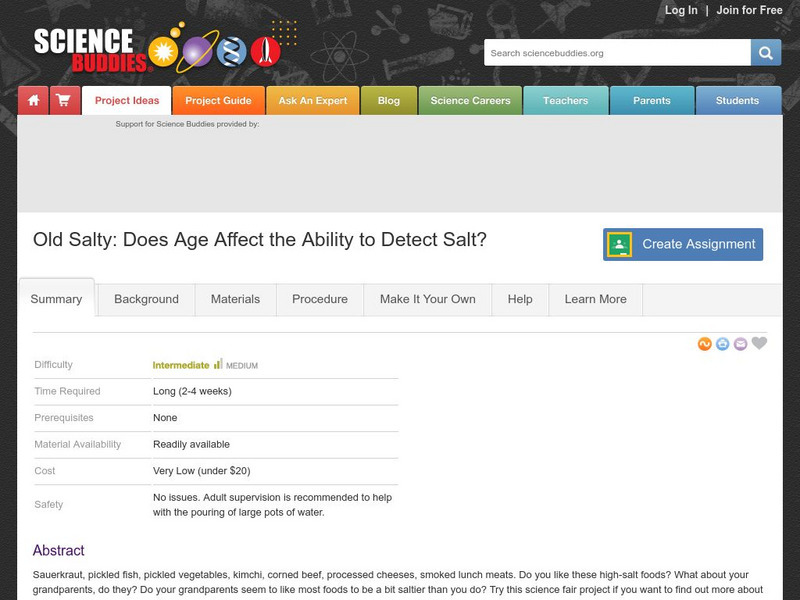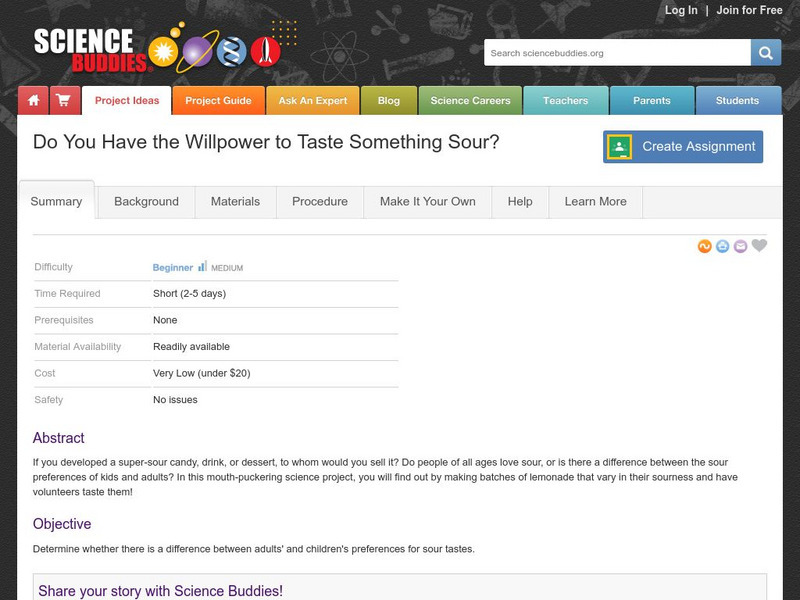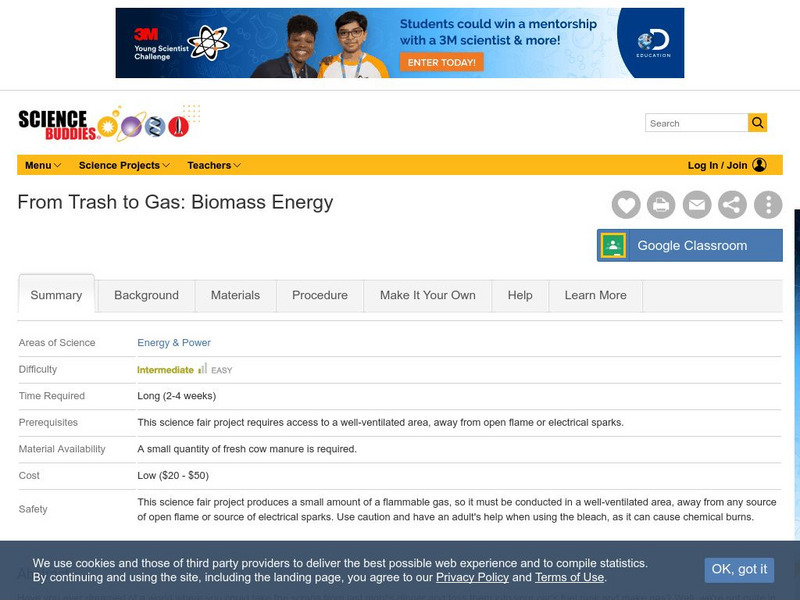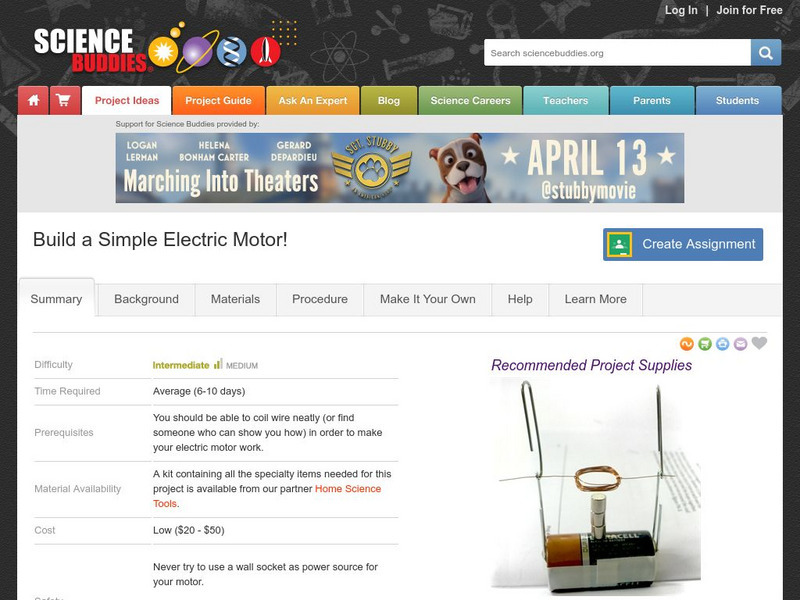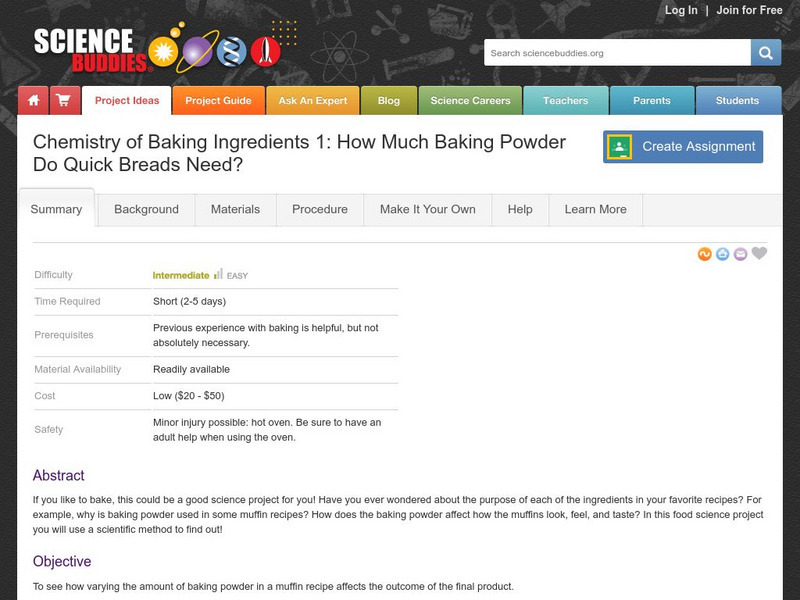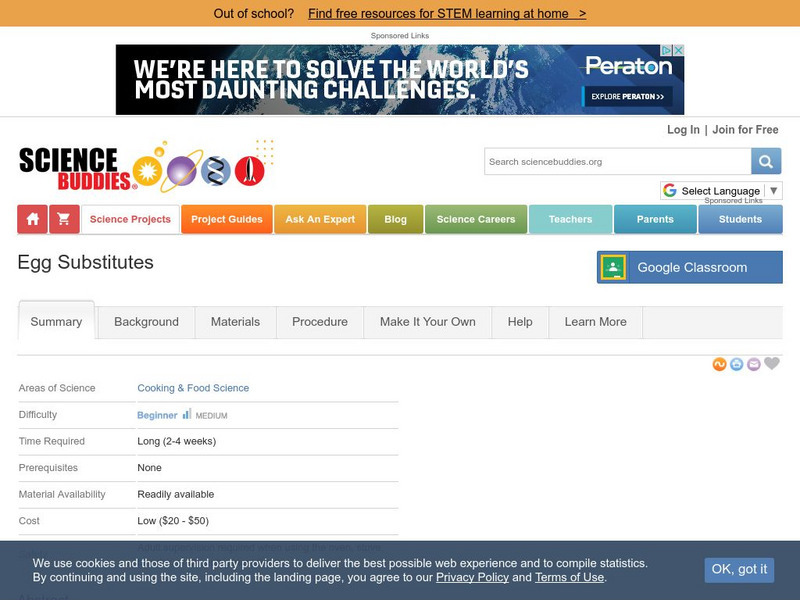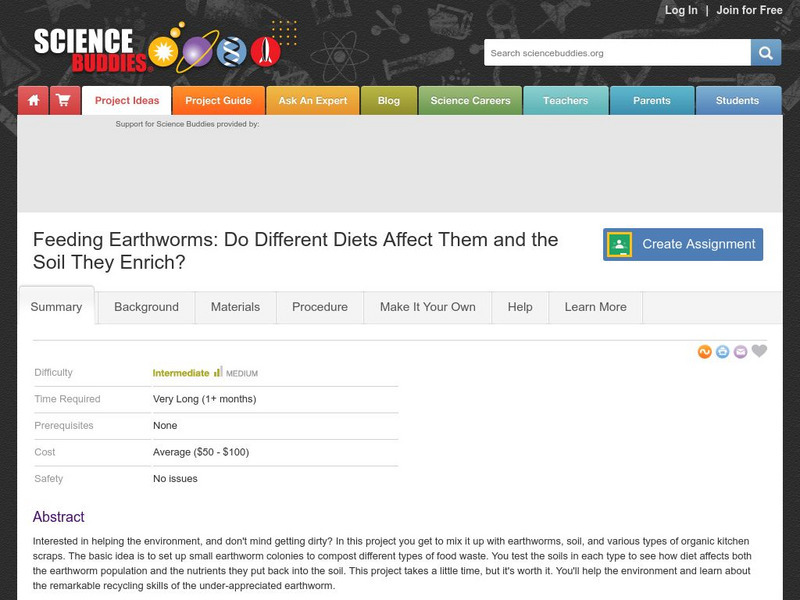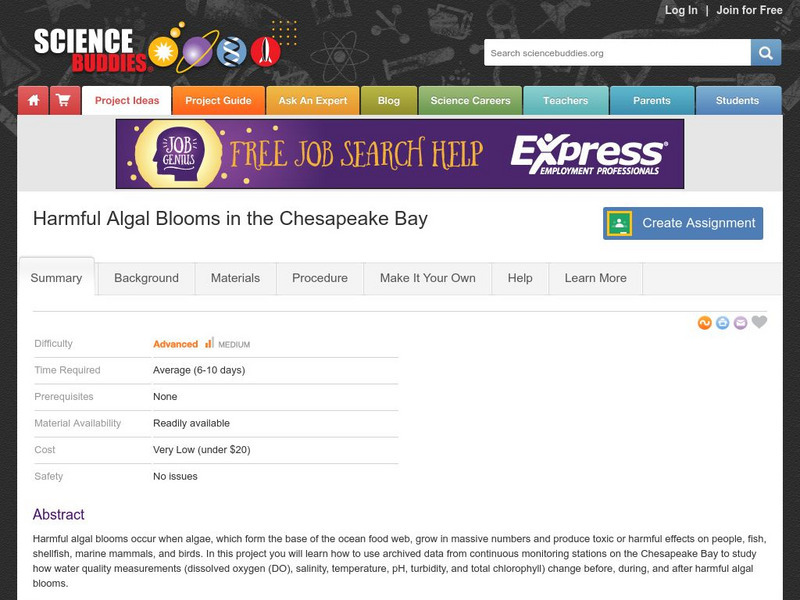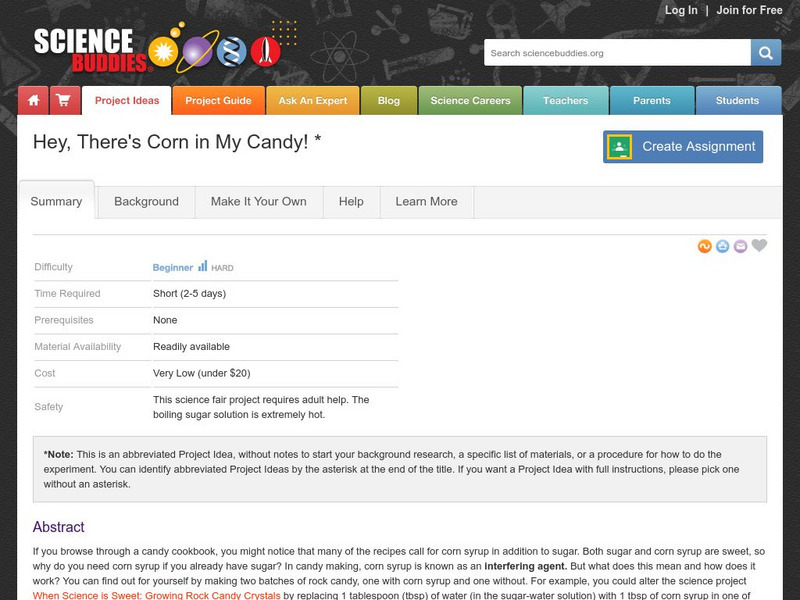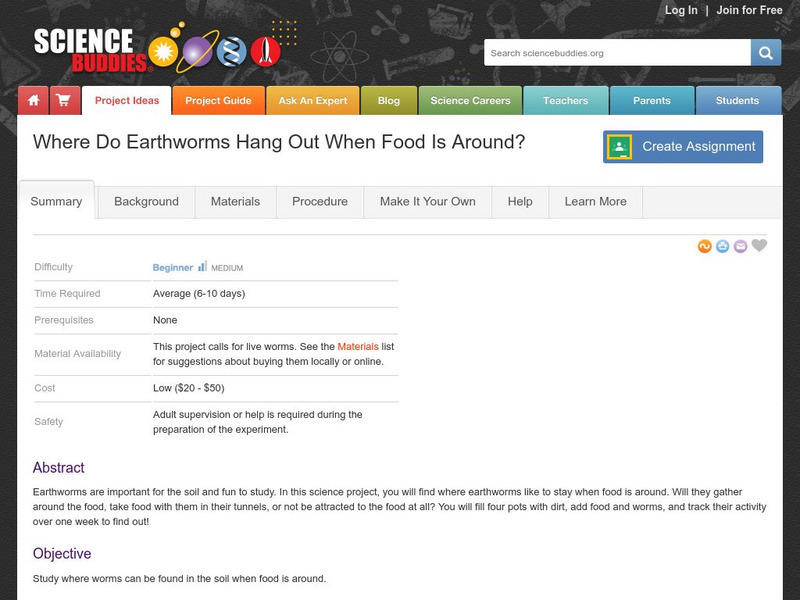Science Buddies
Science Buddies: Project Ideas: Hidden Grasses and Beans in Processed Foods
In this cooking and food science fair project, determine which common crops are found most often in processed foods. The Science Buddies project ideas are set up consistently beginning with an abstract, objective, and introduction,...
Science Buddies
Science Buddies: Project Ideas: What Makes Foams Stand Up Straight
In this food science fair project, students will determine which foods make good edible foams, with high volume and longevity. The Science Buddies project ideas are set up consistently beginning with an abstract, objective, and...
Science Buddies
Science Buddies: You Want Fries With That? The Science of Crispy Potatoes
The first bite of a fresh-picked apple, the crunch of morning toast, the deep cut into rich, flaky layers of baklava, the pleasing snap of a chip. Besides being delicious, what do these foods have in common? They're crisp. They have a...
Science Buddies
Science Buddies: Old Salty: Does Age Affect the Ability to Detect Salt?
Sauerkraut, pickled fish, pickled vegetables, kimchi, corned beef, processed cheeses, smoked lunch meats. Do you like these high-salt foods? What about your grandparents, do they? Do your grandparents seem to like most foods to be a bit...
Science Buddies
Science Buddies: Do You Have the Willpower to Taste Something Sour?
Do try this mouth-puckering science fair project to find out if people of all ages love sour tastes, or if there a difference between the sour preferences of kids and adults. You might be able to sell creations of your own based on your...
Science Buddies
Science Buddies: From Trash to Gas: Biomass Energy
Have you ever dreamed of a world where you could take the scraps from last night's dinner and toss them into your car's fuel tank and make gas? Well, we're not quite in "Back to the Future" yet, but in this energy science fair project,...
Science Buddies
Science Buddies: Fast Food: Can Peppermint Improve Reaction Times?
Did you know that some teachers give their students a peppermint candy on state testing days? Is it to give the kids sweet-smelling breath? Or are the teachers hoping for something more on the important testing day? In this human biology...
Science Buddies
Science Buddies: Spin Right 'Round With This Simple Electric Motor
If you put on clothes that were washed in a washing machine, rode in a car, ate food from a fridge, warmed up lunch in a microwave, or played a video game, you used an electric motor. Try this science fair project and you'll learn how to...
Science Buddies
Science Buddies: How Much Baking Powder Do Quick Breads Need?
If you like to bake, this could be a good project for you. There is a purpose for each of the ingredients in your recipes, but not everyone is always aware of what that purpose may be. Though this lab takes multiple days, you will...
Science Buddies
Science Buddies: Can Baking Soda Substitute for Baking Powder in a Recipe?
There's nothing quite like the smell of fresh-baked muffins for breakfast on a Saturday morning. If you're into baking, you might want to try this insightful project that lets you witness the chemistry behind making muffins. You'll get...
Science Buddies
Science Buddies: Determining Iodide Content of Salt
In this week long "kitchen chemistry" project you will use chemicals from the supermarket to test for the presence of iodine and iodide in salt. These are common micronutrients added to some preparations of table salt. A materials list,...
Science Buddies
Science Buddies: Egg Substitutes
Egg allergies are not uncommon, therefore many egg substitutes are sold in order to bake, and cook recipes that call for them. In this science project idea, you'll investigate how to modify recipes so that even egg-allergic friends and...
Science Buddies
Science Buddies: Get Down and Dirty: How Does Soil Change With Depth?
What covers less than 10% of the Earth's surface, yet is a vital natural resource for terrestrial life? What filters ground water and supports most of our food production, not to mention the production of building materials and paper?...
Science Buddies
Science Buddies: How Diets Affect Earthworms and the Soil They Enrich
In this environment-oriented experiment, you will mix it up with earthworms, soil, and various types of organic kitchen scraps. The basic idea is to set up small earthworm colonies to compost different types of food waste. You test the...
Science Buddies
Science Buddies: Tough Beans: Which Cooking Liquids Slow Softening the Most?
Beans are important to the diets of many people, that is why you always find it cooked a specific way or in a specific dish in different cultures. Here you will learn how the liquid that beans are cooked in affects how quickly or slowly...
Science Buddies
Science Buddies: Harmful Algal Blooms in the Chesapeake Bay
Harmful algal blooms occur when algae, which form the base of the ocean food web, grow in massive numbers and produce toxic or harmful effects on people, fish, shellfish, marine mammals, and birds. In this project you will learn how to...
Science Buddies
Science Buddies: Hey, There's Corn in My Candy!
In candy making, corn syrup is known as an "interfering agent." You can find out just what this agent does by making two batches of lollipops, one with corn syrup and one without and examining the differences between the two. Once you...
Science Buddies
Science Buddies: Juice Box Geometry
Juice boxes are so convenient, just poke the straw in and sip away. It might surprise you how much thought goes into the design and manufacturing of a juice box. Each manufacturer has carefully calculated how big each side should be to...
Science Buddies
Science Buddies: Earthworms: Nature's Tiller?
Everybody knows that worms are good for the soil, but not everybody knows why. This lab shows you how to efficiently measure earthworms within units of soil to determine their affect on decomposition and reduction of surface residue.


